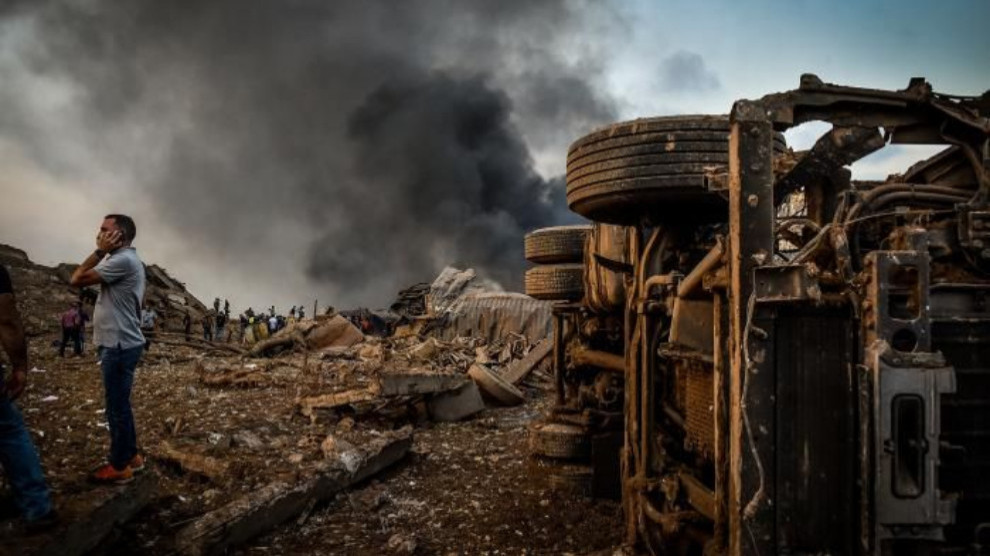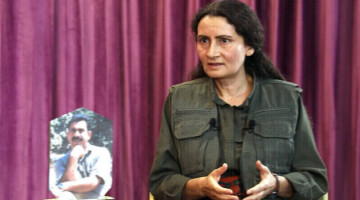Lebanon, which remained a French protectorate until 1943 after the end of the Ottoman occupation with World War I, was involved in a civil war for 15 years from 1975 to 1990.
In the country where Shia, Sunni and Maronite Christians lived, the civil war caused the death of 150 thousand people and the injury of hundreds of thousands more.
With the end of the civil war, Lebanon, which is governed by an administrative model based on ethnic-sect and religious sharing, is not only an area for regional powers' struggle for domination, but also an area for international powers' struggle for domination.
The explosion that devastated Beirut on 4 August occurred in a depot storing some 2,750 tons of ammonium nitrate in the Port of the city. 154 people have died and more than 5,000 have been injured. Many unfortunately are still under the rubble.
After the explosion that destroyed more than half of the city and left nearly 300,000 homeless, Lebanese politics, already fragile, have become even more fragile.
The explosion and regional and international powers
Regional and international powers see the explosion in many ways as an opportunity to be effective in Lebanon and weaken their rivals.
Many regional and international powers have developed proposals, from economic aid to reconstruction. Among the suggestions are that saying that in fact Lebanon is going under the mandate of France again.
While the Gulf countries and the Western bloc are trying to break the influence of Iran and Hezbollah in the country, countries and forces such as Iran, Hezbollah and Syria are in a hurry to manage the crisis. Russia and China are also seeking influence in Lebanon.
Kurdish woman politician Bûşra Elî and the president of the Newroz Society-Culture Association in Lebanon Henan Osman talked to ANF about the political, social and economic effects and opportunities opened by the Beirut explosion.
The beginning of a new era
Büşra Elî said: "There is a picture that does not matter much anymore, whether the explosion was an accident, negligence, sabotage, attack or any other reason”, and Henan Osman added: “This explosion will be the beginning of a new era for Lebanon. This explosion will be a turning point in many ways.”
When asked about the crisis management of Lebanese politics after the explosion, Büşra Elî said that the ammonium nitrate in the port had been there for 6 years and all political parties were aware of the danger. Elî added: "There is a ruined city in the middle, hundreds of dead, hundreds of missing people, thousands of injured and hundreds of thousands of homeless people. But instead of thinking about this, Lebanese politics calculates who can use this explosion, who can use it against whom."
Henan Osman added: “The explosion caused great destruction. It did not only destroy buildings, but it also destroyed many dreams."
Osman continued: "The Lebanese political class is primarily responsible for this explosion. Moreover, this explosion also brought about commercial, political and social destruction."
A regional and international colony
Underlining that Iran, Saudi Arabia and some Western states are present in Lebanon's politics, Büşra Elî said: "Although Lebanon is a regional colonial country, it is also an international colonial country." And this ‘colonial status’ should be always taken into account.
Henan Osman, on the other hand, stated that every side is connected to a different power in the Lebanese political class and added: "Lebanon is the gateway of the Shia crescent to the Mediterranean. At the same time, it is a country where Saudi Arabia has influence over Sunnis. Which is why this explosion will have consequences in politics too.”
Büşra Elî said that with the explosion some countries "thought they had the opportunity to prune Iran's nails in Lebanon", and added that the Turkish state was looking at Lebanon as the remnant of the Ottoman Empire and also "saw the explosion as an opportunity to get into Lebanon".
Büşra Elî said that the doors of a new process are opening for Lebanon, and added that the current political layer of Lebanon, which has been struggling with many conflicts as well as the economic and political crisis for a long time, cannot bear this burden anymore.
"At the moment, the Lebanese political class’ approach to the explosion is worse than the explosion," says Henan Osman, adding: "This explosion will bring many other aftershocks."
Stating that the port is in the hands of Hezbollah and that the government and other parties are aware of it, Büşra Elî said: "It is not possible to blame only one side and acquit the other."
Henan Osman added: "The corruption of the Lebanese political scene is a common feature and affects every party.”
Referring to the importance of the Port of Beirut, Büşra Elî said: "The Port of Beirut is important for Beirut politics for two reasons. First, it has an economic importance, secondly, it has a political importance. The power that held this port was politically and economically powerful. The political and economic power has collapsed with the explosion.”
Henan Osman, on the other hand, stated that Lebanese politics was built on sharing. "After the end of the civil war in Lebanon, the political class that caused the war also shared Lebanon geographically, politically, socially and economically.”
Lebanon is open to intervention
Lebanon has become open to any intervention after this explosion, said Elî adding: "Turkey is looking to intervene, Russia is trying to get a firmer hold on the country. The United States and some Western countries are after political accountability."
Everyone is offering help to Lebanon, but any help will come with a catch.
"The situation will not be the same as before. There is intense pressure on the government to break the influence of Iran and Hezbollah," Henan Osman said adding: "Even if the political embargo is lifted and aid is brought in, there will be new conditions. For example, Macron was here the day before. France will try to increase its influence. Again, Russia and China are trying to increase their influence. But none of them really help the country.”
The people’s reaction
While Büşra Elî said that the explosion has the potential to start a new process in the entire Middle East, Henan Osman confirmed that more repercussions will be seen in the coming days.
Evaluating the distrust of the Lebanese people against the political class, Büşra Elî said: "The people had already reacted to the administration. But this is the last drop. For example, during Macron's visit, a woman says to Macron ‘If you are going to help, do not help this corrupt government and politics’.”
Henan Osman, on the other hand, said that many people expressed their longing for the French mandate during Macron's visit. Macron said he would “never interfere in Lebanese politics” but seek a “new political deal” from the country’s leaders, pressing hard for change. “I am going to talk to them … I will hold them accountable,” he said.
Büşra Elî said: "If the sectarian, political, ethnic and religious differences are not set aside in Lebanon, the country will be open to all kinds of regional and international interventions." A scenario that will have effects on the whole Middle East, especially in Syria. "If Syria coughs, Lebanon gets sick. But the opposite is also true. Any instability or stability that will occur in Lebanon will directly affect Syria. We are facing a very sensitive and painful process in Lebanon and the Middle East."














